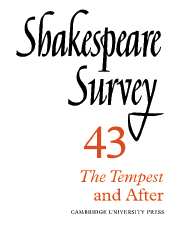Book contents
- Frontmatter
- The Power of Magic: From Endimion to The Tempest
- Reading The Tempest
- The Latter End of Prospero’s Commonwealth
- Henry VIII and the Deconstruction of History
- The Politics of Conscience in All is True (or Henry VIII)
- Shakespeare’s Romantic Innocents and the Misappropriation of the Romance Past: The Case of The Two Noble Kinsmen
- The Hand of John Fletcher in Double Falsehood
- ‘The Duke my Father’s Wrack’: The Innocence of the Restoration Tempest
- ‘Remember/First to Possess his Books’: The Appropriation of The Tempest 1700-1800
- The Tempest and After
- Poetry’s Sea-Changes: T. S. Eliot and The Tempest
- The New Function of Language in Shakespeare’s Pericles: Oath versus ‘Holy Word’
- The Discovery of The Rose Theatre: Some Implications
- The Origins of the Roxana and Messallina Illustrations
- Recycling the Early Histories: ‘The Wars of the Roses’ and ‘The Plantagenets’
- Shakespeare Production in England in 1989
- Professional Shakespeare Productions in the British Isles, January-December 1988
- The Year's Contributions to Shakespeare Studies: 1 Critical Studies
- 2 Shakespeare’s Life, Times, and Stage
- 3 Editions and Textual Studies
- Books Received
- Index
The Year's Contributions to Shakespeare Studies: 1 - Critical Studies
Published online by Cambridge University Press: 28 March 2007
- Frontmatter
- The Power of Magic: From Endimion to The Tempest
- Reading The Tempest
- The Latter End of Prospero’s Commonwealth
- Henry VIII and the Deconstruction of History
- The Politics of Conscience in All is True (or Henry VIII)
- Shakespeare’s Romantic Innocents and the Misappropriation of the Romance Past: The Case of The Two Noble Kinsmen
- The Hand of John Fletcher in Double Falsehood
- ‘The Duke my Father’s Wrack’: The Innocence of the Restoration Tempest
- ‘Remember/First to Possess his Books’: The Appropriation of The Tempest 1700-1800
- The Tempest and After
- Poetry’s Sea-Changes: T. S. Eliot and The Tempest
- The New Function of Language in Shakespeare’s Pericles: Oath versus ‘Holy Word’
- The Discovery of The Rose Theatre: Some Implications
- The Origins of the Roxana and Messallina Illustrations
- Recycling the Early Histories: ‘The Wars of the Roses’ and ‘The Plantagenets’
- Shakespeare Production in England in 1989
- Professional Shakespeare Productions in the British Isles, January-December 1988
- The Year's Contributions to Shakespeare Studies: 1 Critical Studies
- 2 Shakespeare’s Life, Times, and Stage
- 3 Editions and Textual Studies
- Books Received
- Index
Summary
DISTINGUISHED SHAKESPEARIANS
Some distinguished Shakespearians who are neither elderly nor particularly stately are none the less moving into the ranks of elder states-persons with the appearance of collections of their essays.
Barbara Everett has reprinted some of her valuable essays in Young Hamlet: Essays on Shakespeare's Tragedies (Oxford: Clarendon Press, 1989). Pieces on the four major tragedies are reprinted from the Times Higher Educational Supplement and the London Review of Books, and the original publishing context has allowed free play to Everett's distinctively lively and intimate tone as she constantly draws the reader into sharing delicately glimpsed moments which unobtrusively lead to firm pictures of the plays as totalities. The other essays have been published before in academic journals, but they retain the qualities of wit and quiet wisdom: Romeo and Juliet, Troilus and Cressida, Othello - and a ring-in comedy, Twelfth Night. I hope the inclusion of the last does not mean that we cannot look forward to a volume of Everett on the Comedies.
Ernst Honigmann has published Myriad- Minded Shakespeare: Essays, Chiefly on the Tragedies and Problem Comedies (London: Macmillan, Contemporary Interpretations of Shakespeare, 1989). Most of the essays are either reprinted, or interestingly conflate several different pieces. Formerly unpublished pieces include an essay on Julius Caesar, and one on All's Well (is it a 'feminist play'?). Most of the essays show Honigmann as critic rather than textual scholar, although there is his classic article on stage-directions and a lively amalgam 'Shakespeare at work: preparing, writing, rewriting'.
- Type
- Chapter
- Information
- Shakespeare Survey , pp. 219 - 235Publisher: Cambridge University PressPrint publication year: 1991

